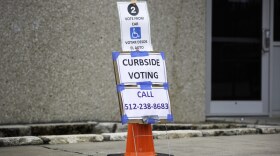After months of campaigning and millions spent on advertising, most candidates for statewide and local offices in Texas will know on Tuesday (or early Wednesday) if they move on to the general election in November.
This year’s contest includes matchups for Texas governor, attorney general, land commissioner, and several other statewide seats. In Texas, candidates must receive 50% plus one of the vote total to avoid a runoff. Click here to check out what’s on your ballot below and read on for more information.
Governor
First elected in 2014, incumbent Gov. Greg Abbott is running for his third term but faces some notable challengers this year. They include former state Senator Don Huffines, a Dallas-area Republican who has criticized Abbott on issues including the 2021 winter storm, the partial state shutdown during the COVID-19 pandemic, and border security, despite Abbott making the Texas-Mexico border a key platform of his campaign and directing funds to build a state-owned barrier on the southern border. Allen West, the former chair of the Texas Republican Party and a one-term Florida congressman is also running. West has campaigned on issues that include eliminating tax subsidies for corporations and promoting more energy independence, according to his website.
Abbott should be able to steer clear of a May runoff election, according to a poll conducted by UT Austin’s Texas Politics Project earlier this month. The poll of 1,200 registered voters showed Abbott had the support of 60% of Republican voters.
In the Democratic primary, former U.S. Rep. Beto O’Rourke is considered the front-runner to take on Abbott in the November general election. Both candidates have so far largely conducted their campaigns as if an Abbott-O’Rourke matchup is inevitable. The same poll that had Abbott besting his challengers by wide margins had O’Rourke with more than 90% support from Democratic voters.
O’Rourke is trailing Abbott by 10% in a hypothetical November matchup, according to the same poll. Last month O’Rourke launched a statewide tour of major urban areas affected by the 2021 winter storm and subsequent power outage that led to the deaths of hundreds of Texans. Meanwhile, Abbott has painted O’Rourke as an anti-gun liberal who favors open borders.
Attorney General
The Republican primary for attorney general is one of this year's most high-profile contests. Incumbent Ken Paxton is facing a robust field of Republican challengers with statewide name ID. They include current Texas Land Commissioner George P. Bush, former Texas Supreme Court justice Eva Guzman, and U.S. Rep. Louie Gohmert, R-Tyler.
Polling shows that this race could head to runoff election in May. Paxton’s challengers are stressing that he’s served the office under a cloud of controversy since his indictment on charges of securities fraud in 2015. Paxton was also subsequently accused by former employees of misusing his office to help donor.
Gohmert has gone after Paxton on the alleged corruption issue, arguing that if Paxton wins the primary, the Republican-held seat could wind up in the hands of a Democrat because of Paxton’s legal woes. Guzman and Bush have focused a large part of the campaigns on discrediting the other, with Bush accusing the former judge of being soft on border security, including in this recent advertisement.
In the GOP primary for AG, a new @georgepbush TV ad hits @EvaGuzmanForAG, claiming she "opposes [Bush's] plan to finish Trump's wall, calling it a ploy."
— Patrick Svitek (@PatrickSvitek) February 22, 2022
Guzman says in an intvu the claim is "ludicrous" & she's been "unequivocal" since she launched that she supports the wall. pic.twitter.com/oIn8UvJEBN
Guzman has said her opponents have taken to lying about her stances on the border, critical race theory and other major topics because they fear her qualifications.
Land Commissioner
Because Bush is bowing out of his current office, there is a wide field of candidates from both sides of the aisle vying to replace him as land commissioner. The main charge of the office is managing millions of acres of state-owned land. The land commissioner is also charged with overseeing the disbursement of benefits to Texas’ veterans. Leading the crowded field on the Republican front is state Sen. Dawn Buckingham, who has taken to familiar GOP talking points in her campaign, including border security and support for the oil and gas industry, Houston Public Media reported in February.
Jay Kleberg, who previously ran unsuccessfully for the Texas House as Republican, is part of the packed Democratic field of candidates for land commissioner.
Other things you should know
There are also some notable down-ballot races that have garnered national attention due to intraparty dynamics that have pitted Democrats against each other. They include the state’s 28th Congressional district, where veteran lawmaker Henry Cuellar, a self-proclaimed moderate “blue dog” Democrat is facing a rematch against his former intern Jessica Cisneros, who lost the 2020 primary by fewer than 3,000 votes.
Cisneros has the backing of New York Congresswoman Alexandria Ocasio Cortez, a leading figure among the country’s progressives who campaigned for Cisneros last month. Cisneros has also earned the endorsements of U.S. Sens. Bernie Sanders and Elizabeth Warren.
Cuellar’s Laredo home was raided by the FBI in January in what’s been reported as an investigation into Azerbaijan companies. Cuellar denied any wrongdoing and said he is cooperating with law enforcement. Despite that setback, Cuellar is one of Laredo’s favorite sons and has been a well-known name in Texas politics for decades. Before being elected to Congress, he served in the Texas House and was a Texas secretary of state, appointed by former Texas Gov. Rick Perry.
Tuesday’s election is also the first since the Texas Legislature passed Senate Bill 1, an omnibus voting bill that made several changes to current election practices. Key among them is the requirement that mail-in ballot applications contain new information that include driver’s license of Social Security information. This has led to the rejection of thousands of applications and ballots during early voting. The issue became so problematic for some that Harris County officials have asked the Biden administration to intervene and stop what they allege is voter suppression.
In the lead up to Election Day, voter turnout was below 10% during the two-week early voting period that began Feb. 14. As of Monday, the secretary of state’s office shows that only about 9.5%, or about 1.64 million Texans, cast ballots. That’s out of more than 17 million registered voters.
Copyright 2022 The Texas Newsroom















